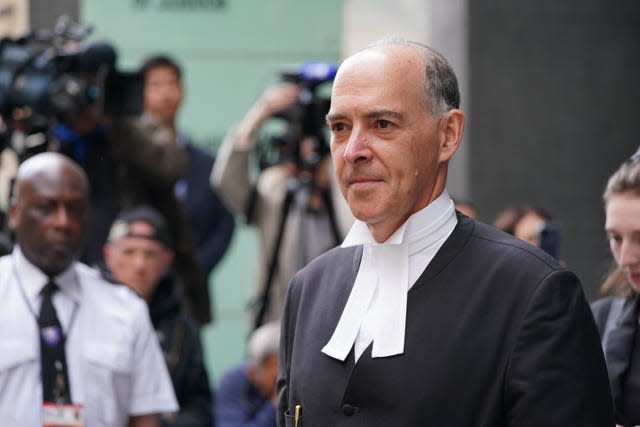Duke of Sussex returns to witness box for hacking trial evidence

The Duke of Sussex has resumed giving evidence in his claim against the publisher of the Daily Mirror over alleged unlawful information gathering.
Harry arrived outside the Rolls Building in central London at 9.52am in a black Range Rover wearing a dark suit and silver tie, stepping back into the witness box shortly before 10.30am.
The duke, 38, is suing Mirror Group Newspapers (MGN) for damages, claiming journalists at its titles – which also include the Sunday Mirror and Sunday People – were linked to methods including phone hacking, so-called “blagging” or gaining information by deception, and use of private investigators for unlawful activities.
On Tuesday, Harry faced nearly five hours of questions from a barrister for MGN as he became the first senior royal in more than two decades to appear personally in court proceedings.
As the duke’s cross-examination resumed on Wednesday, Andrew Green KC, for MGN, asked Harry about an article published in the Sunday People in May 2005 about him having a knee injury and fellow cadets at Sandhurst complaining he was given “preferential treatment” by being let off “gruelling marches”.
Mr Green asked about a press release issued by Clarence House about the injury, which included a quote from Harry.
The barrister asked if the duke stood by the evidence in his witness statement, in which he said he was not “going around discussing any medical issues or injuries”.
“Yes, it is entirely accurate,” Harry replied. “That is a reference to while I was at Sandhurst and the distrust that I ended up having … with the medical staff at Sandhurst.”
Mr Green then turned to an article published in the Independent on the same day as the People article, and asked the duke if he accepted there was a degree of public interest in the story.
Harry replied: “No, I do not.”
Mr Green asked the duke what he thought a public interest story about him would be, to which he said: “A life-threatening injury, I’m sure there are others.”
Harry is set to finish his oral evidence on Wednesday afternoon.
He alleges that about 140 articles published between 1996 and 2010 by MGN titles contained information gathered using unlawful methods, and 33 of these have been selected to be considered at the trial.
During the duke’s first day in the witness box, Mr Green asked why Harry has complained about articles in MGN titles when the same information had previously been put into the public domain by other media outlets.
Harry said his understanding was that MGN journalists used unlawful methods to get “exclusive” angles on existing stories or to move the story on in some way.
Part of the publisher’s case is that the stories came from a range of lawful sources, including information disclosed by royal households, freelance journalists and news agencies as well as confidential sources with “extensive” royal contacts.
The court previously heard that MGN say that the information in one of the articles in Harry’s claim came from an on the record interview the duke had given to the Press Association, now known as the PA news agency, to mark his 18th birthday.

In his written evidence before the court, Harry said MGN’s alleged intrusion into his life contributed to “a huge amount of paranoia” in his relationships.
In a 49-page witness statement, the duke said that he found it “very hard to trust anyone, which led to bouts of depression and paranoia”.
“Friendships were lost entirely unnecessarily,” he continued, later adding that some of his friends “became instant targets”.
The duke later said that he can now see “how much of my life was wasted on this paranoia”, adding: “I’ve always heard people refer to my mother as paranoid, but she wasn’t.
“She was fearful of what was actually happening to her and now I know that I was the same.”
Mr Green questioned Harry on about 20 of the 33 articles over the course of Tuesday.
The barrister also asked Harry about his claim that articles “caused him to be paranoid and to distrust those around him”, and whether he was referring to specific MGN articles or “the general effect of all of the articles” about him.
Harry said: “Yes, because … it is 20 years ago and I simply can’t other than speculate whether I saw these articles at the time.
“I certainly saw a lot of articles at the time and was made aware … unfortunately, by the behaviour and reaction of my inner circle.”
The duke added that when information he had told to only a few members of his inner circle was made public, “your circle of friends starts to shrink”.

MGN is contesting his claim and has either denied or not admitted that articles about Harry being examined at the trial involved phone hacking or unlawful activity.
At the start of the duke’s individual case on Monday, Mr Green said there was “simply no evidence capable of supporting the finding that the Duke of Sussex was hacked, let alone on a habitual basis” and that payment records used in the duke’s claim “simply do not demonstrate unlawful conduct or knowledge thereof”.
Harry’s claim is being heard alongside three other “representative” claims during a trial which began last month and is due to last six to seven weeks.
The three other representative claimants are Coronation Street actor Michael Turner, known professionally as Michael Le Vell, who is best known for playing Kevin Webster in the long-running soap, former Coronation Street actress Nikki Sanderson, and comedian Paul Whitehouse’s ex-wife Fiona Wightman.

 Yahoo News
Yahoo News 
